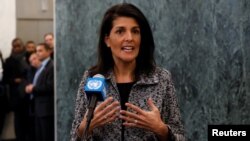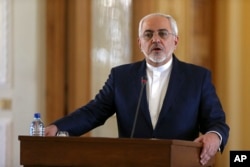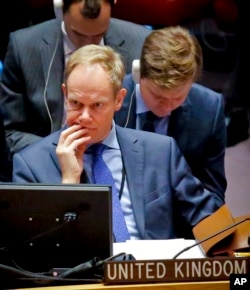Iran's recent ballistic missile launch is “absolutely unacceptable” and the Trump administration will not turn a “blind eye” to such actions, U.S. Ambassador to the United Nations Nikki Haley said Tuesday.
Haley spoke briefly to reporters after attending her first meeting of the U.N. Security Council a session Washington requested.
“We did call a meeting today to discuss what we know, which is we have confirmed that Iran did have a missile launch, a medium-sized missile launch testing on January 29, on Sunday,” she said. “That is absolutely unacceptable.”
Iran confirmed Wednesday that it carried out the missile launch but said it was not in violation of its 2015 nuclear agreement with world powers.
Under U.N. Resolution 2231, which was adopted after the Iran nuclear deal was agreed among six world powers and Tehran in 2015, Iran was “called upon” not to undertake any activity related to ballistic missiles. But the resolution did not specifically demand it.
U.S. President Donald Trump has called the Iran nuclear deal “terrible,” and while campaigning had threatened to tear it up.
Have to back Resolution 2231
Haley, during her Senate confirmation hearing, characterized it as a “disappointment” that “created more of a threat,” but said she would focus on Iran's compliance with its provisions.
“What we know for a fact is that Resolution 2231 basically said that they could not go forward with ballistic missile testing,” Haley said. “What we need them to know is that Security Council Resolution 2231 means something.” She said she told her 14 council counterparts that the resolution is only as good as its enforcement.
“So, what we are hearing from Iran is that they are being naive, saying ‘we have no intention of attacking any country.’ I will tell the people across the world that is something we should be alarmed about,” Haley added.
She said the United States is not naive. “You will see us call them out as we said we would, and you are also going to see us act accordingly.”
Limit Iran access to technology
Haley said the United States also will follow through to make sure prohibitions on supplying Iran with technology to do such launches would be respected.
“We have said with this administration that we are not going to show a blind eye to these things that happen,” Haley said. “We're gonna act, we're gonna be strong, we're gonna be loud and we're gonna do whatever it takes to protect the American people and the people across the world, because that's what the goal is supposed to be.”
“There was very significant concern about the ballistic missile launch, which has now been confirmed,” Britain's U.N. envoy Matthew Rycroft told reporters.
Launch called 'inconsistent'
Rycroft said they have asked the committee that monitors implementation of Resolution 2231 to review the incident, and the council also has asked U.N. Secretary-General António Guterres to investigate and report back to them.
He said the January 29 launch is “inconsistent” with Resolution 2231, and he urged Iran to abide by all of its obligations. He urged Tehran to consider the regional repercussions of their actions.
“This is a step which is potentially destabilizing in an already unstable region,” Rycroft said.
Iran's U.N. mission sent out a statement reiterating its foreign ministry position, saying, “Security Council Resolution 2231 does not prohibit legitimate and conventional missile activities. We reject politically motivated comments regarding Iran's missile program.”


